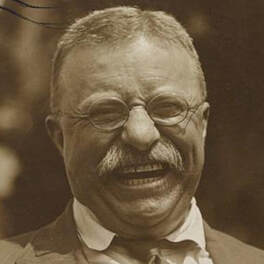 By WCS Headmaster Dr. Roger Erdvig Theodore Roosevelt didn’t always wear his famous round spectacles. In fact, we find in his autobiography that it wasn’t until late in his childhood that he even realized that he was terribly nearsighted. Though he loved to study nature as a boy, he recalled that he was “always at a hopeless disadvantage” and befuddled because he couldn’t see—and yet was “wholly ignorant that [he] was not seeing.” When he finally got his first pair of glasses, “an entirely new world was opened” to him. This is a common story… an elementary student struggles with paying attention in class but then gets glasses and everything changes. An aspiring tennis player can’t improve beyond basic proficiency until he gets glasses and suddenly he can see the ball just as it hits his opponent’s racquet and his game instantly improves. These are great analogies for another kind of seeing—how we see, understand, and navigate the world around us. Philosophers call this a worldview, and as its name implies, it functions as the lens through which a person views the world. But beyond merely seeing, our worldview dictates how we live in the world. |
Cultivating godly influencersWilmington Christian School provides a distinctively Christian, innovative education that effectively develops Godly influencers who are well prepared for life after high school and who impact the culture for Christ. Archives
May 2024
Categories
All
|
|
Wilmington Christian School provides a distinctively Christian, innovative education that effectively develops Godly influencers who are well prepared for life after high school and who impact the culture for Christ.
Wilmington Christian School admits students of any race, color, national and ethnic origin to all the rights, privileges, programs, and activities generally accorded or made available to students at the school. It does not discriminate on the basis of race, color, national and ethnic origin in administration of its educational policies, admissions policies, scholarship and loan programs, and athletic and other school-administered programs. |
|
|
© Copyright Wilmington Christian School. All Rights Reserved.
Website designed by PROSPER Creative Design
Website designed by PROSPER Creative Design


